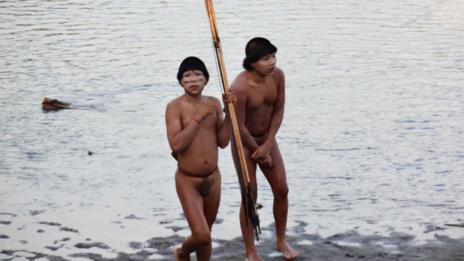
The sad truth about uncontacted tribes
One of the world’s last isolated tribes has apparently emerged from the
forest. Rachel Nuwer investigates whether there is anyone left who has
never seen the outside world, and discovers that ‘first contacts’ are
often cursed by death and disease.
On July 1, Funai, the Brazilian governmental agency in charge of indigenous Indian affairs, quietly posted a short press release
on its website: two days earlier, they said, seven members of an
isolated Indian tribe emerged from the Amazon and made peaceful contact
with people in a village near the Peruvian border.
As the first
official contact with such a tribe since 1996, the event was out of the
ordinary. But the event itself could have been anticipated. For weeks,
local villagers in Brazil’s Acre state had reported sightings of the
tribesman, who supposedly came to steal crops, axes and machetes, and
who “mimicked monkey cries” that frightened women and children.
The Indians’ decision to make contact was not driven by a desire for
material goods, however, but by fear. With the help of translators who
spoke a closely related indigenous Panoan language, the Acre Indians
explained that “violent attacks” by outsiders had driven them from the forest. Later, details emerged that their elder relatives were massacred,
and their houses set on fire. Illegal loggers and cocaine traffickers
in Peru, where the Indians are thought to come from, are likely to
blame, according to the Brazilian government. Indeed, Funai’s own nearby
monitoring post was shut down in 2011 due to increasing escalations
with drug traffickers.
www.bbc.com/future/story/20140804-sad-truth-of-uncontacted-tribes
After they decided the situation called for drastic measures, the
Indians did not just stumble upon the Brazilian village by chance – they
probably knew exactly where to go. “They know far more about the
outside world than most people think,” says Fiona Watson, research
director for the non-profit organisation Survival International. “They are experts at living in the forest and are well aware of the presence of outsiders.”
This
gets to the heart of a common misconception surrounding isolated tribes
such as the one in Acre: that they live in a bubble of wilderness,
somehow missing the fact that their small corner of the world is in fact
part of a much greater whole – and one that is dominated by other
humans. “Almost all human communities have been in some contact with one
another for as long as we have historical or archaeological records,”
says Alex Golub, an anthropologist at the University of Hawaii at Manoa.
“Human prehistory is not like that game Civilization where you start with a little hut and the whole map is black.”
In some cases in the 70s and 80s, the Brazilian government did try to
establish peaceful contact with indigenous people, often with the aim of
forced assimilation or relocation. They set up “attraction posts” –
offerings of metal tools and other things indigenous Indians might find
to be valuable – to try and lure them out of hiding. This sometimes led
to violent altercations, or, more often than not, disease outbreaks.
Isolated people have no immunity to some bugs, which have been known to
wipe out up to half of a village’s population in a matter of weeks or months. During those years, missionaries traipsing into the jungle also delivered viruses and bacteria along with Bibles, killing the people they meant to save.
Summer is upon us and you
are almost certainly planning at least one trip to the beach. This
year, as you lie back in the sun, put down your book or magazine and
sift the sand through your fingers - and take a moment to reflect upon
how much of the world economy is built on the stuff.
I don't mean "built on sand" in a philosophical sense,
however true that may be. I'm talking about three technological
revolutions that are literally based on sand, one of which is only just
beginning and, if it lives up to its potential, has mind-boggling
implications.
You've probably already guessed the element at the heart of these revolutions - silicon, the main component of sand.
The original silicon revolution was of course, glass. Man
first began to explore its properties a million and a half years ago -
that's when our ancient ancestors discovered that obsidian, the almost
jet black glass which is sometimes formed when lava cools rapidly, was
useful.
Obsidian breaks leaving a very keen edge, so was good for
weapons and tools including, in some ancient cultures, knives used for
ritual circumcisions.
But it wasn't until the first civilizations arose in the plains of Mesopotamia that we learned to actually make glass.

www.bbc.com/news/magazine-28600802
 Flemish or German miniature depicting a 15th Century glass-blowing factory
Flemish or German miniature depicting a 15th Century glass-blowing factory

Before the newly released
Dawn of the Planet of the Apes film, there was a long franchise going
back to the first Apes movie - the 1968 classic with Charlton Heston.
But before that there was the book.
Today few people have heard of Pierre Boulle. He was the
French author who first had the brilliant idea of humans travelling in
time and stumbling on ape civilisation. It was in his 1963 novel
La Planete des Singes (Planet of the Apes).
But there's more. It turns out that Pierre Boulle was also
the man behind another cinema great - none other than The Bridge on the
River Kwai. A book on the face of it so quintessentially British - about
a British colonel and his conception of duty and honour. How on earth
could it have been written by a Frenchman? And how did that same
Frenchman then move from wartime adventure to the world of science
fiction for his second Hollywood triumph?
Pierre Boulle died in Paris in 1994, after a writing career
that spanned more than 40 years and resulted in some 30 novels and
collections of short stories.
But it was his life before taking up the pen that shaped his
literary outlook. From the mid-1930s he was a rubber planter for a
British company in Malaysia. And in World War Two he served as an
undercover agent for the Special Operations Executive (SOE).
For The Bridge on the River Kwai he was writing of a world he knew well.
"Pierre Boulle was profoundly Anglophile," says Jean Loriot, who heads the Association of Friends of Pierre Boulle.
"In the Far East he worked alongside English people. He was
impregnated by English culture. He admired the English greatly. And when
he came to write he made many of his heroes English."
www.bbc.com/news/magazine-28610124



 Flemish or German miniature depicting a 15th Century glass-blowing factory
Flemish or German miniature depicting a 15th Century glass-blowing factory 

